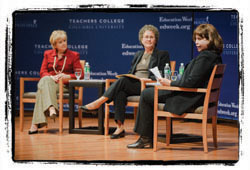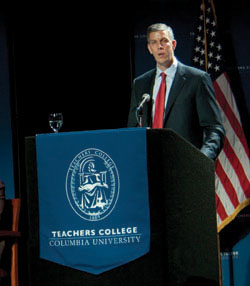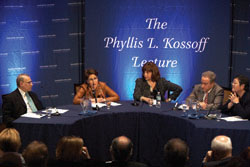Front and Center on the National Stage
When TC Trustee Joyce Cowin, along with her late mother, Sylvia J. Berger, donated funds to TC to create a new conference center, Cowin’s rationale was that an institution that stands at the center of so many important national debates should have a suitable facility in which to host them.
Since then, it’s safe to say that the College has more than justified Cowin’s generosity. And while not all among TC’s extraordinary series of public events of the past two years have been held in the stunning new Cowin Conference Center, each has lent weight to TC President Susan Fuhrman’s assertion that the College is, quite literally, the premier address for the national conversation on education writ large.
TC’s first major event at the Cowin Center took place in late October 2008, when Linda Darling-Hammond, education advisor to Barack Obama, and Lisa Graham Keegan, education advisor to John McCain, faced off on the eve of the presidential election. Before a capacity crowd and a Webcast audience of more than 9,000 people, the two speakers (moderated by Fuhrman) presented starkly different assessments of American education and its future.
Darling-Hammond, a former TC faculty member who is now the Charles E. Ducommun Professor of Education at Stanford University, called for an “equalization of resources,” declaring, “Right now, we don’t have the capacity to ensure that everyone gets what is really the new civil right—access to a high-quality education.” Citing the nation’s low global ranking in the areas of math (35th) and college access (15th), Darling-Hammond cautioned that these poor rankings “are costing us in many ways—in our economy, in our national security.”
But Keegan, former Superintendent of Public Instruction for Arizona public schools, responded that the U.S. “in real current dollars has quadrupled our funding since 1968, and at the same time we have had achievement absolutely flat, slightly negative.” If money were the answer, she said, “then New Jersey and [Washington] D.C. ought to be off the charts, and they are not.”
The two speakers differed on charter schools, pre-K education and standardized student assessments. They agreed only on Fuhrman’s observation that too little notice had been paid in the presidential campaign to the issue of education.
One year later it was U.S. Secretary of Education Arne Duncan’s turn. In delivering TC’s inaugural Phyllis L. Kossoff lecture, Duncan—the former chief executive of Chicago’s public school system—called for a “sea change” in the nation’s teacher preparation programs. While praising TC and a few other top institutions, Duncan said that most education schools are “doing a mediocre job of preparing teachers for the realities of 21st-century classrooms.” Duncan called for tougher accreditation standards for education schools, more hands-on teaching experience for education school students, a greater focus on urban teaching and the creation of systems to track successful teachers back to the education programs that produced them.
Less than a month later, Merryl Tisch, Chancellor of the New York State Board of Regents (and a TC alumna), and David Steiner, the state’s new Commissioner of Education, came to TC to outline their vision for the state’s pre-K–12 education system.
Tisch made it clear that, in order to meet eligibility requirements for federal Race to the Top funding (a pot of some $4.3 billion created by the Obama administation), New York will open the door to the creation of more charter schools. Still, she called upon charters to better include and support at-risk student populations.
Steiner suggested that “tunnel vision” by the national standards movement has come at the expense of meta-cognitive skills, critical thinking and “content-rich,
sequenced curricula.”
sequenced curricula.”
But the biggest attention-grabber was the proposal by Tisch and Steiner to allow nonacademic institutions, ranging from museums to the Board of Regents itself, to certify teachers and grant them Master’s degrees. TC faculty member Aaron Pallas responded that such a system could pose “a serious threat to the nature of graduate education” and lead to “the explicit decoupling of the production of knowledge from the preparation of practitioners.”
As this report went to press, TC was keeping the conversation going with two other important events in Cowin. First, the College’s Campaign for Educational Equity was holding the first major national symposium to analyze the impact of the American Reinvestment and Recovery Act (ARRA), which enables the U.S. Department of Education to distribute $100 billion to states over the next two years for public schools suffering from the effects of the recession. And next, TC was hosting the National Conference of State Legislators’ annual National Education Seminar, the theme of which this year was “What Works to Improve Education: Lessons from Research, Policy and Practice.” TC faculty members Tom Bailey, Amy Stewart Wells, Michael Rebell, Kevin Dougherty and Charles Basch were to speak.
But debate at TC isn’t just about K–12 education, nor is it solely focused on the United States. Also at a forum in March 2010, Basch and his former student at the College, Howell Wechsler, Director of the U.S. Centers for Disease Control and Prevention’s Division of Adolescent and School Health (DASH), were to discuss seven major health risks that disproportionately affect urban, minority and low-income youth. And in October 2009, Lee Sing Koh, Director of Singapore’s National Institute of Education (NIE) visited TC with his NIE colleagues Christine Kim-Eng Lee (a TC alumna), Christine Goh and Ee-Ling Low to discuss the philosophy and strategy that has made one of the world’s smallest countries also one of its most educationally successful.
Issues change with the times, and so does the conversation. But it seems pretty clear that whatever people in education, health and psychology are talking about years or even decades down the road, they’ll still be talking about it at Teachers College.
The U.S. Secretary of Education praised TC and other top institutions, but called for tougher accreditation standards for education schools, more hands-on teaching experience for education school students,
and other changes.
and other changes.
Published Thursday, Apr. 1, 2010


